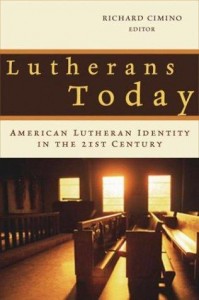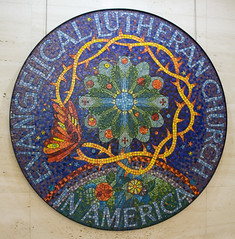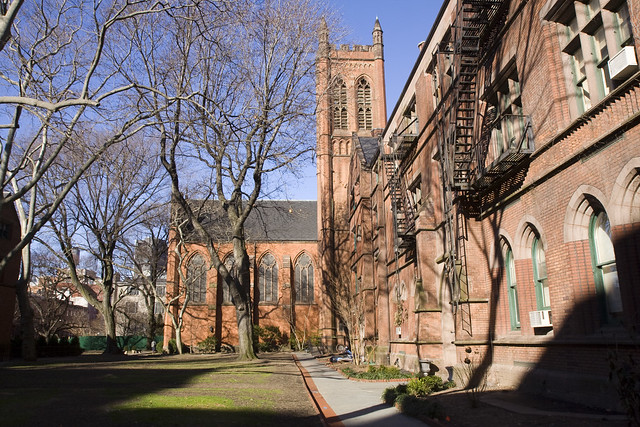It seems that, during the Seventh Session (Tuesday June 9th at 9 am), during a resumption of the Report on Unfinished Business, the opinion of the faculty in regards to communion cups was received and “adopted as the expression of the sense of the Synod upon this point” (see page 71). This response was written at the request of the Ministerium in 1902 on why individual communion cups shouldn’t be used (see Eng. Min., 1902 page 30; Germ. Minutes, 1902 p 32). In the 1902 minutes, on page 30, it’s reported that the Ministerium reaffirmed its actions of 1895 (Eng min p 25:10): “That we unqualifiedly condemn the introduction of the individual communion cup.” This number on the agenda was item 13 which was a request from the congregation at Nazareth, PA, that the ministerium reaffirm its action from 1895. Note: If someone could score a copy of what happened in 1895, I would appreciate it.
June, A.D. 1903 page 161
Appendix I. “The Individual Communion Cup”
Opinion of the Philadelphia Faculty
Within the last few years, an innovation in the mode of administering the Lord’s Supper has been introduced into many congregations of other denominations, and into a few of our own name in this country. As long as there was no danger of interference with the uniformity that has prevailed in our churches this innovation could very properly be left unnoticed. But since a few of our congregations have been agitated by the example and the discussion in other denominations, the time has come, in the judgement of the Evangelical Lutheran Ministerium of Pennsylvania, for an opinion on the subject.
The practice referred to is that of the so-called “individual communion cup.” According to it, in the administration of the Holy Supper, each communicant takes from a try, offered by the officiating pastor, a minute cup containing a small amount of wine, and, after having drunk, replaces the cup in the tray. The plan provides also in large congregations for the washing of the emptied vessels while the communion proceeds, in order that they may be refilled for subsequent communicants.
In regard to this practice, we must concede that it belongs to the non-essentials of the sacrament. The sacrament is not destroyed by the variation in the mode of its administration. If the practice, abolished by the protests of Ph. J. Spener, of Administering the wine through reeds or tubes, were to be re-introduced, the sacrament itself would be unaffected. Nor would it be any the less the Lord’s Supper if, according to ancient practice, the wine were largely diluted with water. These are non-essentials; but, nevertheless, they are matters of no light moment. The essentials of a sacrament may be unaffected, while, with it, there may be practices interfering with its impressiveness, destroying reverence for a holy ordinance of God, disturbing the minds of devout communicants, and confusing the order of the Church.
Our Fathers, in the Formula of Concord (Solida Declariation, x:9) have declared:
“We believe, teach and confess that, in regard to adiaphora, the Church of God, of every time and place, has the fullest power, according to circumstances, to change, abrogate and appoint anything, provided it be done without levity and offense, becomingly, and in good order, and that, at each particular time, regard be had to that which, to the greatest extent, promotes good order, godly discipline, and the edification of the Church.”
A change, even though it be in regard to matters that are of themselves adiaphora, which completely antagonizes and revolutionizes a practice sanctions not only by the usage of the Church in all ages, in all lands and under all Confessions, where the cup has not been denied the laity, but also by the example of the Apostles and the institution of our Lord Jesus Christ Himself, should not be contemplated by individual pastors and congregations, except in consultation and agreement with the churches with which they are synodically united. The good order of the Church and the edification of believers are not promoted by radical changes in the administration of the Holy Supper, that occasion great diversities and contrasts among congregations that profess to stand in closet fellowship with one another. Wherever the practice is unusual, the mind of the communicate is withdrawn from “the chief thing” in the sacrament, the words, “for you,” to the innovation, and to all the associations that have suggested and the arguments urged for its introduction.
The historical practice, observed by our churches, teaches, with great force and clearness, the fact that, while our Lord, by the gift of His Body and Blood to the individual communicant, assures him individually of the forgiveness of sins, the communion is not to separate, but to unite, believing children of God with one another. As a pledge of such union, the Lutheran Order of Service lays particular emphasis on the common cup. The exhortation in the Church Book and Common Service eliminates in the words: “For we are all one bread and one body, even as we are all partakers of this one bread, and drink of this one cup. ” The principle is not necessarily that of an entire congregation being restricted to but one cup at an administration, but that of a number of communicants drinking from the same vessel, as a testimony to the common bond that unites them in soul and body by partaking of the same Lord. What they elsewhere shrink from doing, they cheerfully do here, in recognition of their Lord’s unspeakable love to them and to each, even the least and the vilest, of their brethren.
As to the one argument upon which the innovation rests, that of the danger of incurring disease, the lists of the hundreds of thousands communing yearly in our churches, and of the repetition of similar communions in all Protestant churches, for nearly four hundred years now, since the Reformation, is a stronger argument than that urged by the professed scientific spirit of any particular age. If there be remote danger, this is found not only in the use of a common cup, but also in inhaling the same air, a peril which can be avoid only by completely isolating ourselves from our fellow-men.
The refinements of modern life have, after all is said, probably more to do with the proposed change than even sanitary reasons. It must be acknowledged that, where proper precautions are not employed by pastors, there are abused which give much ground for offense. Every possible care should be taken to cleanse the cup continually during the administration and fulfill every requirement suggested by regard for cleanliness and decency. Ordinary prudence will indicate that special attention should be given to communicants whose participation in a general communion might, because of disease or other serious physical cause, render others reluctant to commune after them.
With these precautions, there is no reason among us for deviating from the historical practice.
Where variation from it occurs, a revision of the entire Communion service should be necessitated. The innovation is foreign and antagonistic throughout the spirit of the Lutheran Church. Denominations in which the Lord’s Supper is distributed not by the pastor but by church officers, through the pews or otherwise, for their own self-administration, can adopt the change far more readily than a Church which seeks most directly and immediately to reach the individual communicant with word and element applied through the pastor. The innovation sacrifices the individualization of the word to the individualization of the cup. Neither “good order,” nor “good discipline,” nor “the edification of the Church” either requires or even advises it. Until a demand, based on such reasons, be recognized by the general agreement and official action of the Church, no individual pastor or congregation should yield to any sudden clamor for it, and thus arbitrarily separate from the common and approved practice of the Church.
The Faculty
Mount Airy, Philadelphia, March 18th, 1903.
 Last week, I finally discovered the “Lutheran” sections at General’s library. I am a little embarrassed it took me this long to find them – and it took my wandering around the library while looking for a book on Christian ethics to literally walk into them. One entire section, dominated by Martin Luther and his haters and lovers, another section devoted to old books still classified in the Dewey system (like an 1898 copy of a Lutheran cylopedia and a graduate thesis written in the 1930s, and paid by the WPA, to categorize the historical writings and artifacts located in Lutheran churches in New York). The third section, located near the back, marked BX8000 or so, is all about modern day Lutherans. And it was there that I stumbled onto the book Lutherans Today: American Lutheran identity in the 21st Century. Written in 2003, the book is a tad out of date (the Call to Common Mission is the focus of most of the arguments with the threat of the human sexuality statement looming in the background) but I’m really enjoying it.
Last week, I finally discovered the “Lutheran” sections at General’s library. I am a little embarrassed it took me this long to find them – and it took my wandering around the library while looking for a book on Christian ethics to literally walk into them. One entire section, dominated by Martin Luther and his haters and lovers, another section devoted to old books still classified in the Dewey system (like an 1898 copy of a Lutheran cylopedia and a graduate thesis written in the 1930s, and paid by the WPA, to categorize the historical writings and artifacts located in Lutheran churches in New York). The third section, located near the back, marked BX8000 or so, is all about modern day Lutherans. And it was there that I stumbled onto the book Lutherans Today: American Lutheran identity in the 21st Century. Written in 2003, the book is a tad out of date (the Call to Common Mission is the focus of most of the arguments with the threat of the human sexuality statement looming in the background) but I’m really enjoying it. 

